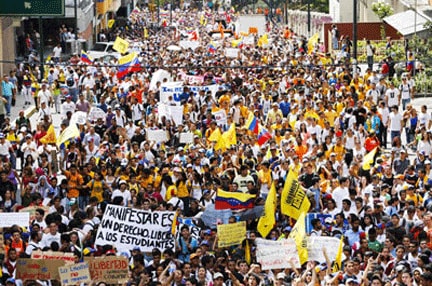Venezuela turmoil: A test for President Maduro
(Baonghean) -The Latin American country of Venezuela is witnessing unprecedented protests by the opposition and students against the government of President Nicolas Maduro. This is the largest wave of protests that President N. Maduro has faced since his election, after his predecessor Hugo Chavez passed away last year. The current political instability is not only a big challenge but also a "test" for President Maduro, on the path to realizing the goal of "democracy and social progress" for Venezuela.
 |
| Venezuela protests escalate into violence. |
After nearly half a month of chaos from anti-government protests, it seemed that the political situation in Venezuela had calmed down when opposition leader Leopoldo Lopez, who led the protests, surrendered. President Maduro himself three days ago also affirmed that the plans of fascist groups plotting to cause riots and sabotage the country had been repelled and peace had been restored. However, instability returned when yesterday (February 22) hundreds of students and protesters continued to take to the streets in the capital Caracas to pressure President Maduro to resign. More importantly, the protests have spread and escalated into violence, killing nearly 10 people and injuring more than a dozen others. Protesters say that President Maduro's government is not capable of controlling inflation, rampant crime and shortages of basic necessities. President Maduro said that the protests were just a pretext for a coup plot that he called "domestic and foreign enemies" similar to what happened in 2002. At that time, President Hugo Chavez faced a coup plot but quickly regained his position with his prestige and management skills. The current situation is not as serious as 12 years ago, but what is happening in Venezuela these days shows that President Maduro is facing a huge challenge and is a "test" for his 10-month-old government.
In fact, less than a year after President H. Chavez passed away, this South American country is facing the risk of economic collapse. Inflation has skyrocketed and reached 56.2% in 2013, the local currency Bolivar has lost its value rapidly on the "black market" and foreign exchange reserves have plummeted. Even the oil industry, considered the most prosperous sector of Venezuela, is facing difficulties due to lack of investment capital. Therefore, although it is the spearhead of the national economy, Venezuela's oil industry cannot generate enough revenue to cover the government's subsidy programs. Venezuela seems to have used up all the tools to prevent a widespread economic crisis. The South American country's foreign exchange reserves are at their lowest level in 8 years. According to expert Juan Pablo Fuentes of Moody's Analytics, Venezuela's foreign exchange reserves as of mid-September 2013 were only 22 billion USD, down 26% compared to the end of 2012, at the lowest level in 8 years. In addition, China, the main source of capital for Venezuela, has tightened its purse strings after loans to promote oil exploitation activities did not bring results.
It should be recalled that, during his 14-year term, the late President Hugo Chavez made great efforts to boost the economy, reduce poverty and improve people's livelihoods. Venezuela's extreme poverty rate fell to 6% in 2012 and the country ranked 71st out of 187 countries in the world on the Human Development Index. These achievements were achieved thanks to the policy of using oil profits to improve people's lives. However, as oil production gradually narrowed, Venezuela needed to have reforms to develop the economy to replace this energy source. These are clearly the tasks that the current government must shoulder. A solid economy will help President Maduro's government not be shaken by "sabotage" or "coup" plans. President Maduro's administration once claimed that the opposition continuously carried out many sabotages of production facilities and power plants in many localities; At the same time, they colluded with private enterprises to carry out commodity speculation plans, disrupting the market, thereby accusing the government of being weak in its management, as well as being unable to improve the country's complicated situation.
In addition, Venezuela’s murder rate is now the third highest in the world. Up to 79% of Venezuelans are worried about their personal safety, and foreign tourists are afraid to go out at night. Analysts say that if the situation does not improve significantly in the short term, the opposition could launch a constitutional referendum to “oust” President Maduro when he is halfway through his six-year term.
The commitment to continue the path of the late President Chavez with social programs for the poor during the election campaign helped Mr. Maduro win the presidency. However, with the economic situation that this oil-rich country is facing, it is clear that the promises to solve the insecurity situation, fight corruption and improve the efficiency of the Government are not small challenges for the current President Maduro. And it is clear that what President Maduro's government needs to do right now is to push back the wave of protests in recent days and create a stable political environment. This will not only help President Maduro "score points" in the eyes of the people who once supported him, but also be a great opportunity for him to be able to more thoroughly implement the Fatherland Plan, the Government's action program for the period 2013-2019 that the late President Chavez left and which has been approved by the Venezuelan National Assembly.
Thanh Huyen






